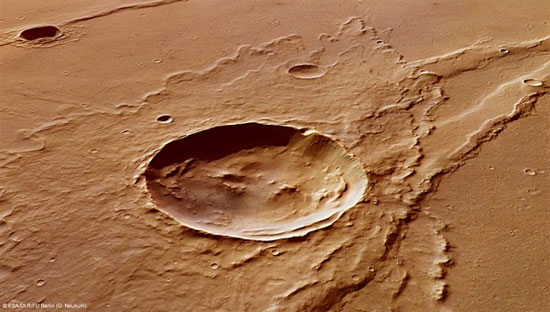Russia and Europe all look for life on Mars
Yesterday the Russian Space Agency (Roscosmos) and the European Space Agency (ESA) signed a cooperation agreement on the search for signs of life on the red planet.
Under the agreement between Roscosmos and ESA, the two sides will launch a robot to the surface of Mars.ExoMars , the name of the robot, will take the soil sample and bring it back to earth. Scientists will analyze the amount of soil to look for signs of bacteria and other life forms, VOA reported.

A big hole on the surface of Mars. (Photo: ESA)
Russia and Europe's Mars expedition will consist of two phases. In the first stage, a spacecraft will bring the robot to Mars in 2016. Then another spacecraft will fly to the red planet in 2018 to bring land to Earth. Russia will provide boosters, design landing modules and robots.
ESA and Roscosmos signed an agreement in the context of American Curiosity autonomous robots discovered that Mars's climatic conditions more than three billion years ago are perfectly suited to the existence of bacteria.
The Curiosity self-propelled device drills a 6.4cm deep hole into a rock and takes dust from the hole for analysis. ESA and Roscosmos want their robots to drill holes up to 200cm deep to take soil samples.
Rolf de Groot, an ESA scientist, said that ExoMars will bring more modern equipment than Curisosity's equipment system. So it will be able to analyze soil and rock on Mars more thoroughly.
- Europe invited Russia to join the Mars project
- Scientists have found 'Mars' right on Earth
- Russian launch project
- Life may have existed 700 million years on Mars
- Mars can nourish life
- Russia and Europe will explore Mars together
- Aliens may have been on Mars 3.8 billion years ago
- Russia and Europe cooperate to launch Mars exploration ships
- Discover the best location to search for life on Mars
- NASA suddenly announced shock about life on Mars
- Be overwhelmed by images of life on Mars that may appear in the future
- New discovery of life survival under the surface of Mars
 Van Allen's belt and evidence that the Apollo 11 mission to the Moon was myth
Van Allen's belt and evidence that the Apollo 11 mission to the Moon was myth The levels of civilization in the universe (Kardashev scale)
The levels of civilization in the universe (Kardashev scale) Today Mars, the sun and the Earth are aligned
Today Mars, the sun and the Earth are aligned The Amazon owner announced a secret plan to build a space base for thousands of people
The Amazon owner announced a secret plan to build a space base for thousands of people